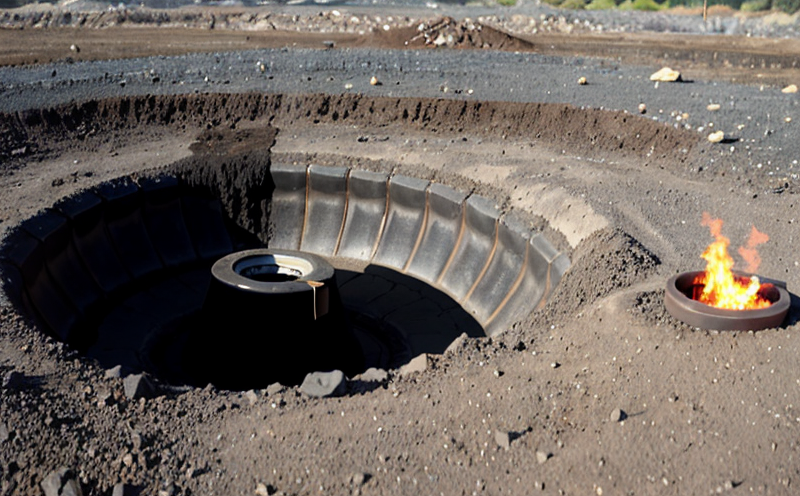JIS M8815 Gross Calorific Value of Coal Testing
The JIS M8815 standard specifies a method to determine the gross calorific value (GCV) of coal and other solid fuels. This test is crucial for quality control, compliance with international trade agreements, and ensuring accurate energy content information for stakeholders involved in mining and fuel supply chains.
Coal plays a vital role in global energy production. Accurate determination of its calorific value ensures that all parties from miners to power plant operators can rely on consistent performance metrics. The JIS M8815 method uses bomb calorimetry, which involves burning the coal sample under controlled conditions and measuring the heat released.
The procedure outlined in this standard is designed to provide reliable and repeatable results. It requires precise handling of the coal sample, including drying, sieving, and ensuring homogeneity before testing. The test apparatus includes a bomb calorimeter, oxygen supply system, and an ignition device. Understanding these components helps in preparing for accurate measurements.
The JIS M8815 method involves several steps: preparation of the coal sample, insertion into the bomb calorimeter, addition of benzoic acid as a reference fuel, filling with distilled water, sealing the bomb, and initiating combustion under controlled conditions. The temperature rise is measured, which allows for calculation of the gross calorific value using specific formulas provided in JIS M8815.
The importance of this test extends beyond just compliance; it also aids in optimizing fuel efficiency in power plants, improving product quality, and enhancing safety standards within mining operations. By adhering to JIS M8815, laboratories ensure they provide accurate data that can influence critical decisions regarding fuel procurement and utilization.
It is essential for quality managers and compliance officers to stay updated with such standards as they form the backbone of reliable energy production processes. Compliance with these regulations not only ensures accuracy but also fosters trust among all parties involved in the coal supply chain.
Applied Standards
The JIS M8815 Gross Calorific Value of Coal Testing aligns closely with international standards such as ASTM D5390, EN ISO 1928, and IEC 62347. These standards provide comprehensive guidelines on how to perform calorific value tests accurately and consistently across different laboratories.
Adherence to these internationally recognized norms ensures that the results obtained from this testing method are universally accepted and comparable globally. This consistency is particularly important in a sector where coal quality can significantly impact energy output, environmental considerations, and economic factors.
Industry Applications
| Application | Description |
|---|---|
| Mining Operations | Determining the calorific value helps in optimizing extraction processes and ensuring compliance with quality standards. |
| Fuel Supply Chain Management | Aids in accurate energy content reporting for trade agreements and contractual obligations. |
| Power Plant Efficiency | Ensures consistent fuel supply to maximize power generation efficiency while minimizing waste. |
| Environmental Compliance | Facilitates adherence to environmental regulations by providing precise data on fuel quality. |
| R&D and Quality Assurance | Serves as a benchmark for developing new processes or improving existing ones related to coal utilization. |
| Procurement Decisions | Enables informed choices about the purchase of coal, ensuring optimal performance and cost-effectiveness. |
| Economic Analysis | Supports accurate economic modeling by providing reliable data on fuel performance metrics. |
- Mining companies use this test to ensure they meet the quality standards required by buyers and regulatory bodies.
- Fuel suppliers rely on these tests to maintain consistent product quality across shipments.
- Power plant operators depend on accurate calorific values for optimizing their fuel consumption rates.
Why Choose This Test
- Precision: The JIS M8815 method offers high precision and accuracy, making it suitable for both research and industrial applications.
- Repeatability: Results obtained from this test are highly reproducible, ensuring consistent outcomes across different samples.
- Compliance: Adherence to international standards ensures compliance with regulatory requirements and trade agreements.
- Reliability: The method has been validated through extensive use in various industries, providing reliable data for decision-making processes.
- Cost-effective: By ensuring accurate fuel quality, this test reduces waste and improves overall efficiency within the supply chain.
- Environmentally Friendly: Accurate calorific value measurements help in reducing emissions by optimizing fuel consumption.
- Traffic Efficiency: Ensuring consistent product quality through this test helps avoid disruptions due to substandard materials.





